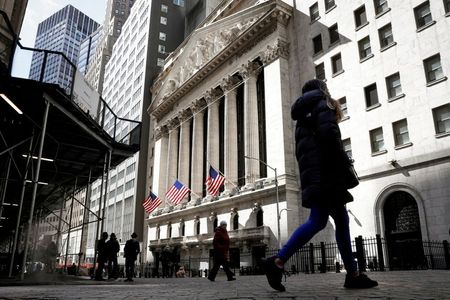By Chuck Mikolajczak
NEW YORK (Reuters) – U.S. stocks climbed on Friday as investors brushed off a stronger-than-expected inflation reading, as both the Dow and S&P 500 indexes clinched their first weekly gain in the past three weeks.
Consumer prices, as measured by the personal consumption expenditures (PCE) price index excluding the volatile food and energy components, rose 0.7% in April, topping analysts’ 0.6% estimate and after a 0.4% increase in March. PCE is the Federal Reserve’s preferred measure of inflation.
In the 12 months through April, the core PCE price index surged 3.1%, smashing through the Fed’s 2% target, as the reopening economy unleashed pent-up demand.
Investors have been closely watching economic data and comments from Fed officials for signs of runaway inflation and the possibility the central bank may begin to pull back on its massive stimulus measures.
“The data is going to remain volatile as well, the inflation data that we saw this morning with core PCE was a high print, but really not that far ahead of consensus,” said Keith Buchanan, senior portfolio manager at Globalt in Atlanta.
“Base effects definitely play a role, distorting the takeaways from some very large year-over-year type of numbers,” he added.
The Dow Jones Industrial Average rose 64.81 points, or 0.19%, to 34,529.45, the S&P 500 gained 3.23 points, or 0.08%, at 4,204.11 and the Nasdaq Composite added 12.46 points, or 0.09%, at 13,748.74.
Graphic: U.S. inflation heats up, https://graphics.reuters.com/USA-ECONOMY/INFLATION/xlbvgkrdxvq/chart_eikon.jpg
For the week, the S&P rose 1.17%, the Dow gained 0.94% and the Nasdaq advanced 2.06%. For the month, the S&P climbed 0.55%, the Dow added 1.94% and the Nasdaq lost 1.53%.
Fed officials have repeatedly maintained in recent days that the central bank is not ready to adjust its monetary support, although some have suggested they are open to begin discussing scaling back its bond-buying plan. On Thursday, Federal Reserve Bank of Dallas President Robert Kaplan said the labor market was tighter than many realize.
Despite the data showing a rise in inflation, U.S. Treasury yields fell and helped lift high-growth technology stocks. Salesforce.com Inc climbed 5.43% after raising its full-year revenue and profit forecasts, helped by increased demand for its cloud-based software during the pandemic.
Inflation concerns have persisted for several weeks and weighed on growth names, many of which reside in the tech-heavy Nasdaq, and the index posted its first monthly decline since October.
Volatility has risen even as the S&P 500 has rebounded to less than 1% below its May 7 record high, and the index saw its smallest monthly gain in the past four in May.
The U.S. stock market will be closed on Monday for the Memorial Day holiday. Analysts cautioned against drawing strong conclusions from Friday’s lightly traded market.
Volume on U.S. exchanges was 10.32 billion shares, compared with the 10.52 billion average for the full session over the last 20 trading days.
Boeing Co fell 1.47% after the Federal Aviation Administration confirmed the planemaker halted deliveries of its 787 Dreamliners, adding fresh delays for customers following a recent five-month delivery suspension due to production problems.
Advancing issues outnumbered decliners on the NYSE by a 1.63-to-1 ratio; on Nasdaq, a 1.12-to-1 ratio favored advancers.
The S&P 500 posted 31 new 52-week highs and one new low; the Nasdaq Composite recorded 108 new highs and 23 new lows.
(Reporting by Chuck Mikolajczak; Editing by Richard Chang)





